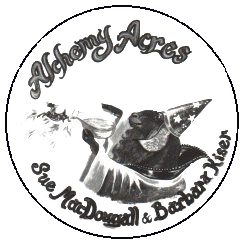
















I recently came across this article which I wrote many years ago describing the treatment of a buck who had stopped ruminating. This was a particlarly nettlesome case, and I thought, perhaps, that herein might lie a few nuggets to help someone else save a valuable animal. Therefore, I'm repeating the article almost verbatim.
Recently, I traded a baby buckling for a magnificent two-year-old buck. This trade benefitted everyone, since the other party had kids from the older fellow and wanted a new buck, whereas I had always admired the breeding and persona of the two-year-old. But when I got Handsome home, he seemed to be off-feed. Well, he'd just been moved, and he was busily trying to "out-macho" my senior herd sire, so I was not too concerned at first. After three days, I went out to groom Handsome, and noticed that he was having trouble urinating. This was BIG TROUBLE. My vet came to the farm within a few hours and confirmed our diagnosis of urinary calculi. She performed a penile amputation. Now this sounds really drastic, but amounted to something more akin to a circumcision, and did not affect his ability to breed. In fact, he didn't even seem to have much discomfort. The operation yielded a bladder stone between 1/8 and 1/4 inch in diameter, so it was no wonder that Handsome was experiencing problems. There is a moral to this story. Since urinary calculi can be caused by an excess amount of calcium in the diet, do not feed your buck alfalfa hay. Also, it can help to add cider vinegar to the bucks water.
Well, that solved the initial crisis, but we were left with a nagging and nettlesome problem. It appeared that the move and the bladder stone had caused Handsome to stop ruminating. And, of course, he still was not eating. We attempted several "tried and true" remedies. Handsome received some Probios, and we massaged his belly to try to get him ruminating and eating again. We tempted his palette with every tasy tidbit of which we could think - tender rose clippings, honeysuckle, pieces of fruit, several blendes of grain, the best hay we could find. We gave him yogurt with active culture and massaged his tummy some more. We tried adding baking soda to his feed. None of this helped enough. He was ruminating only weakly and still picking at his food. We next tried giving Handsome a dose of 2 ounces of Pepto Bismol and 3-4 ounces of Milk of Magnesia. This helped somewhat. After a case of diarhea, he seemed to be cleaned out. He started eating a little more, but it still wasn't enough to suit us. So after consulting the vet one more time, we tried a drug called Peristal. This stimulated contractions of the rumin, and within 24 hours of the last dose of Peristal, he was back on feed. This was a big relief, to say the least. Handsome had far too impressive a pedigree to lose him. I'm happy to report that Honey Bear Alchemist gave us many crops of beautiful kids, and to my knowledge, never had another problem from this again.
I hope that these tidbits of information can help someone else if one of his animals should present the symptoms I described.







